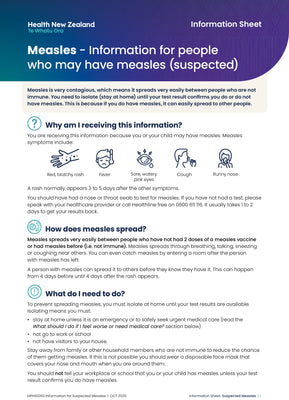Measles - Information for people who may have measles (suspected) - HE8159

The full resource:
Measles is very contagious, which means it spreads very easily between people who are not immune. You need to isolate (stay at home) until your test result confirms you do or do not have measles. This is because if you do have measles, it can easily spread to other people.
Why am I receiving this information?
You are receiving this information because you or your child may have measles. Measles symptoms include:
- Red, blotchy rash
- Fever
- Sore, watery pink eyes
- Cough
- Runny nose
A rash normally appears 3 to 5 days after the other symptoms.
You should have had a nose or throat swab to test for measles. If you have not had a test, please speak with your healthcare provider or call Healthline free on 0800 611 116. It usually takes 1 to 2 days to get your results back.
How does measles spread?
Measles spreads very easily between people who have not had 2 doses of a measles vaccine or had measles before (i.e. not immune). Measles spreads through breathing, talking, sneezing or coughing near others. You can even catch measles by entering a room after the person with measles has left.
A person with measles can spread it to others before they know they have it. This can happen from 4 days before until 4 days after the rash appears.
What do I need to do?
To prevent spreading measles, you must isolate at home until your test results are available. Isolating means you must:
- stay at home unless it is an emergency or to safely seek urgent medical care (read the What should I do if I feel worse or need medical care? section below)
- not go to work or school
- not have visitors to your house.
Stay away from family or other household members who are not immune to reduce the chance of them getting measles. If this is not possible you should wear a disposable face mask that covers your nose and mouth when you are around them.
You should not tell your workplace or school that you or your child has measles unless your test result confirms you do have measles.
What should I do if I feel worse or need medical care?
If your symptoms get worse or you need to seek healthcare for other reasons, call your GP, hauora or healthcare provider, or call Healthline free on 0800 611 116, and let them know you could have measles. In an emergency call 111.
If you need to visit a healthcare provider or after-hours clinic in person:
- call ahead and tell them you may have measles. This is so they can protect others from being exposed
- wear a disposable face mask that covers your nose and mouth if you have one.
What happens if my test confirms I have measles?
If your test result confirms you have measles, you must continue to isolate. Your public health service team will contact you to provide information and support and will let you know how long you need to isolate for — this is normally 4 full days after the rash started.
They will also ask you about places you visited and people you had contact with to prevent measles spreading more widely.
What happens if my test confirms I do not have measles?
If your test result confirms you do not have measles, you can go back to your usual activities. This means you can return to work or school once you are feeling well again. If you are still unwell, contact your GP, hauora or healthcare provider or Healthline for advice.
We also recommend that you get immunised against measles. The measles, mumps and rubella (MMR) vaccine is free for all people aged under 18 years and for people aged 18 years and over who are eligible for free New Zealand healthcare. For more information about the MMR vaccine visit info.health.nz/measlesvaccine
For more information
- Visit the Health New Zealand | Te Whatu Ora website info.health.nz/measles
- Free NZ Relay Services are available at nzrelay.co.nz if you are Deaf, hard of hearing, deafblind or have speech communication difficulties.
- Call Healthline on 0800 611 116, anytime 24/7 for free health advice and information about what to do next. You can choose to speak with a Maori clinician if you are calling between 8am and 8pm. Interpreter services and NZ Relay support are also available.
- For people living or visiting rurally, you can contact a doctor after hours at Ka Ora Telecare 0800 2 KA ORA (0800 252 672) or kaora.co.nz
- A dedicated helpline for Disability support is available Monday to Friday, between 8.00am and 5.00pm. Call free on 0800 11 12 13 or text 8988 for help and information, or visit healthpoint.co.nz/disability-helpline